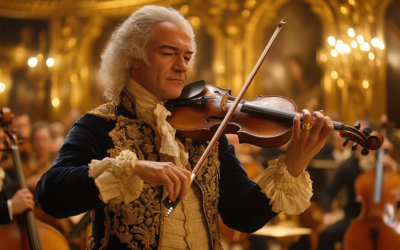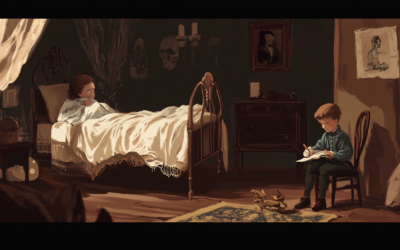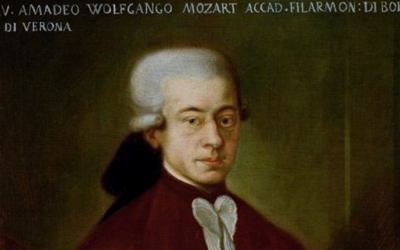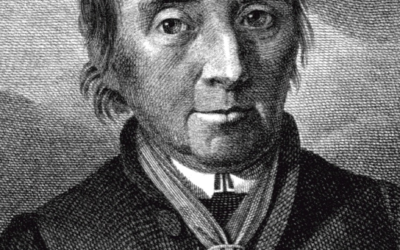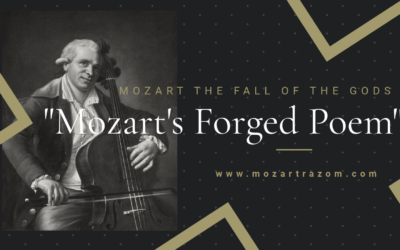Letters Under Surveillance
How Mozart's Family Navigated the Dangerous 18th Century Postal System
In the 18th century, privacy in correspondence was non-existent. Letters were routinely opened and inspected, making it essential for the Mozarts to be cautious with their words. This vigilance is reflected in Leopold Mozart’s carefully crafted letters, which reveal much about the family’s calculated self-presentation
Mozart: The Fall of the Gods
This book offers a fresh and critical look at the life of Wolfgang Amadeus Mozart, challenging the myths that have surrounded him for centuries. We strip away the romanticised image of the “natural genius” and delve into the contradictions within Mozart’s extensive biographies. Backed by nearly 2,000 meticulously sourced citations, this work invites readers to explore a deeper, more complex understanding of Mozart. Perfect for those who wish to question the traditional narrative, this biography is a must-read for serious music lovers and historians.
"Leopold Mozart’s letters were not just personal communications; they were crafted with the knowledge that others—beyond the intended recipient—would likely read them."
Mozart: The Fall of the Gods
In the 18th century, privacy as we understand it did not exist. Letters travelling long distances were often intercepted and inspected before reaching their recipients. By the late 1700s, postal authorities were formally instructed to open and examine correspondence, a task overseen by the Thurn und Taxis family of Regensburg. This family, holding the postal monopoly across much of Europe, made a fortune exploiting the sensitive information gleaned from letters. Count Thaddäus von Thurn und Taxis, in particular, had close ties to the Rothschilds and the Bavarian Illuminati, with Adam Weishaupt encouraging his followers to recruit postal officials to assist in “facilitating correspondence.”
Amid this climate of surveillance, Leopold Mozart’s letters were written with extreme caution, particularly during his travels across Europe. Local political matters were conspicuously absent from his correspondence, which instead focused on more mundane travel details and updates about people in Salzburg. Leopold was careful not to touch on controversial topics, reflecting his prudence—a trait that permeates every aspect of his letters.
“Leopold Mozart’s letters were crafted to carefully construct a narrative of success, avoiding any mention of failure or struggle.”
Interestingly, neither Leopold nor Wolfgang displayed much curiosity about the political landscapes of the countries they visited. The Mozarts’ letters were largely formulaic, recounting only their movements, minor travel mishaps, and the warm receptions they received at various courts. For Leopold, these letters also served a strategic purpose: they were designed to convince the Archbishop of Salzburg—who had funded parts of their travels—of the benefits of his investment. By painting a glowing picture of Wolfgang’s successes, Leopold sought to assure the Archbishop that the family was fulfilling its obligations.
Leopold’s letters, however, reveal a deeper frustration. Despite his efforts to secure prestigious positions for Wolfgang, he doubted that the Archbishop would ever grant his son the recognition he believed he deserved. His correspondence often hints at anxious anticipation, hoping that the constant travel and noble praises would eventually lead to something more permanent.
The Illusion of Universal Praise
Leopold’s letters are filled with flattering depictions of Wolfgang’s receptions across Europe, but these accounts are highly selective. The letters highlight Wolfgang’s interactions with aristocrats and his apparent charm, but they omit less glamorous encounters with ordinary musicians or less significant hosts. When such figures are mentioned, it is often to contrast their insignificance with Wolfgang’s supposed brilliance.
This selective narrative becomes especially clear when Leopold compares Wolfgang’s serenades with other works performed at court. For instance, Leopold claims that Wolfgang’s serenade in Milan overshadowed an opera by Johann Adolf Hasse, but other contemporary accounts, such as those of Giuseppe Parini, tell a different story. Parini’s writings reveal that Hasse’s performance was far from the failure that Leopold suggests, demonstrating how the elder Mozart manipulated facts to maintain the image of Wolfgang as a prodigious talent deserving of admiration and support.
A Carefully Constructed Image
Leopold’s letters were not just family correspondence; they were crafted to be circulated among the elite. Many of the original letters have been lost, and what remains are often copies. This strongly suggests that the letters were intended to be shared widely to bolster the family’s image. Leopold’s letters were part of a larger strategy to present Wolfgang as a rising star, carefully omitting failures or negative experiences.
Leopold also used cryptic language in his letters to avoid the scrutiny of postal censors. Phrases like “for your eyes only” or “not everything can be written” appear frequently, signalling that there were details he chose not to include in writing. Even when recounting their successes, Leopold was mindful of the potential readers beyond the intended recipient.
In a world without privacy, where correspondence was a tool for diplomacy, business, and self-promotion, Leopold Mozart mastered the art of crafting letters that served multiple purposes. His letters reassured patrons, informed friends, and maintained a carefully constructed narrative of success, all while avoiding topics that could harm the family’s reputation. The letters are a testament to the calculated nature of Leopold’s approach to navigating the complex world of European courts.
@mozartrazom
You May Also Like
The Violin Concertos: Mozart’s Borrowed Genius
Mozart’s violin concertos are often celebrated as masterpieces, but how much of the music is truly his? This article delves into the complexities behind the compositions and challenges the authenticity of some of his most famous works, revealing a story of influence, imitation, and misattribution.
#2 The Hidden Truth of Mozart’s Education
In this video, we uncover the hidden truth behind Wolfgang Amadeus Mozart’s early education and challenge the long-held belief in his effortless genius. While history often celebrates Mozart as a child prodigy, effortlessly composing music from a young age, the reality is far more complex.
The London Notebook
The London Notebook exposes the limitations of young Mozart’s compositional skills and questions the myth of his early genius. His simplistic pieces, fraught with errors, reveal a child still grappling with fundamental musical concepts.
The Mozart Question
In this revealing interview, we delve into the lesser-known aspects of Wolfgang Amadeus Mozart’s life, challenging the long-standing myth of his genius. A Swedish journalist explores how Mozart’s legacy has been shaped and manipulated over time, shedding light on the crucial role played by his father, Leopold, in crafting the career of the famed composer.
Georg Nissen and the Missing Notebooks
After Mozart's death, his widow, Constanze, found a steadfast partner in Georg Nikolaus von Nissen, a Danish diplomat who dedicated his life to preserving the composer's legacy. Nissen not only compiled an extensive biography of Mozart but also uncovered and...
#3 Leopold Mozart’s Literary Theft
Hidden within the Mozarteum’s archives lies a poem that has long been hailed as a tribute to the young Mozart children. But behind this innocent façade is a story of deception, literary theft, and one father’s ambition to rewrite history.


